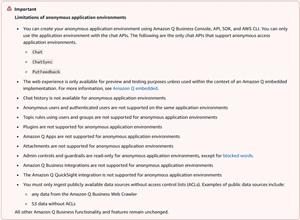News
New AWS AI: Amazon Nova Premier, Llama 4, Anonymous User Q Business Chatbots
Once thought to be lagging behind fellow cloud giants Microsoft and Google in advanced AI, Amazon Web Services (AWS) is maintaining a full-on crusade to even things up -- or more.
Look at what happened in just the past couple days: the general availability of Amazon Nova Premier, the company's self-described most capable multimodal foundation model for complex tasks; the first models in the new Llama 4 herd of models—Llama 4 Scout 17B and Llama 4 Maverick 17B—are now available fully managed in Amazon Bedrock; the company announced anonymous user access for Q Business.
"Customers can now create anonymous Q Business applications to power use cases such as public web site Q&A, documentation portals, and customer self-service experiences, where user authentication is not required and content is publicly available," the company said of the latter in an April 30 post.
 [Click on image for larger view.] Some Limitations (source: AWS).
[Click on image for larger view.] Some Limitations (source: AWS).
Amazon Q Business is a generative AI-powered assistant offered as part of AWS's enterprise cloud services. It's designed to help employees get fast, secure answers to work-related questions by interacting with company data.
Key features include:
- Enterprise Search: Connects to internal data sources like Confluence, Salesforce, S3, SharePoint, and more to retrieve relevant answers.
- Natural Language Interface: Users can ask questions in plain language and receive accurate, contextual responses.
- Customization: Organizations can tailor the assistant with custom plugins, APIs, and business logic.
- Security and Privacy: Built on AWS's identity and access control systems, ensuring responses respect data permissions.
The anonymous chat APIs and web experience are available in the US East (N. Virginia), US West (Oregon), Europe (Ireland), and Asia Pacific (Sydney) AWS Regions, with company offering up Creating an Amazon Q Business application environment for anonymous access documentation, and the Build public-facing generative AI applications using Amazon Q Business for anonymous users post for more guidance.
Amazon Nova Premier
As noted, the company claims this is its most capable model for complex tasks such as processing long documents, videos, large codebases, and executing multistep agentic workflows. The company said it's also its most capable teacher model and can be used with Amazon Bedrock Model Distillation to create custom distilled models for specific needs. This refers to knowldege distillation, where a large, powerful model (the teacher) is used to train a smaller, more efficient model (the student).
The company said Nova Premier extends the capabilities available from its Amazon Nova understanding models with several key improvements that include:
- Superior intelligence: The model scores 87.4% in the Massive Multitask Language Understanding (MMLU) benchmark for undergraduate-level knowledge, 82.0% on Math500 for mathematic problems, and 84.6% on the CharXiv benchmark for chart understanding.
- Improved agentic capabilities: Nova Premier can perform end-to-end actions on behalf of the user, enabling more complex workflows such as Retrieval-Augmented Generation (RAG), function calling, and agentic coding. The model scores 86.3% on SimpleQA with RAG, 63.7% on the Berkeley Function Calling Leaderboard (BFCL), and 42.4% on SWE-bench Verified for software engineering tasks.
- Longer context: The model offers a context window of one million tokens. This enables analysis of bigger data sets like large codebases, multiple documents and images, documents longer than 400 pages, or 90-minute-long videos.
Nova Premier is available in Amazon Bedrock in US East (N. Virginia), US East (Ohio), and US West (Oregon) through cross-Region inference. Related resources include:
Meta's Llama 4 in Amazon Bedrock
Meta's Llama 4 models—Llama 4 Scout 17B and Llama 4 Maverick 17B—are now fully managed and available serverlessly in Amazon Bedrock, the company said yesterday. These advanced multimodal models are designed to handle both text and image inputs, offering enhanced performance and scalability for enterprise applications.
Key features include:
- Multimodal Capabilities: Both models support native multimodal processing, allowing for seamless integration of text and image data.
- Mixture-of-Experts (MoE) Architecture: Utilizes MoE to optimize performance and efficiency, activating only relevant subsets of the model for specific tasks.
- Extended Context Windows:
- Llama 4 Scout 17B: Supports up to 10 million tokens, facilitating complex tasks like multi-document summarization and extensive codebase analysis.
- Llama 4 Maverick 17B: Offers a 1 million token context window, suitable for detailed image and text understanding.
- Language Support: Handles text in 12 languages, including English, French, German, Hindi, Italian, Portuguese, Spanish, Thai, Arabic, Indonesian, Tagalog, and Vietnamese.
Meta's Llama 4 models are available in Amazon Bedrock in the US East (N. Virginia) and US West (Oregon) AWS Regions. Users can also access Llama 4 in US East (Ohio) via cross-region inference. For more, the company offers:
Catching Up and Evening the AI Playing Field
These are just a few of a dizzying array of AI-related announcements the company has made recently, cementing the view that since the dawn of the generative AI boom, AWS has ramped up efforts to compete with Microsoft and Google. It's done that by launching its own foundation models (Titan, Nova), investing heavily in AI infrastructure, partnering with companies like Anthropic, and introducing services like Amazon Bedrock and the enterprise assistant Amazon Q. The company looks like it's not slowing down.
About the Author
David Ramel is an editor and writer at Converge 360.